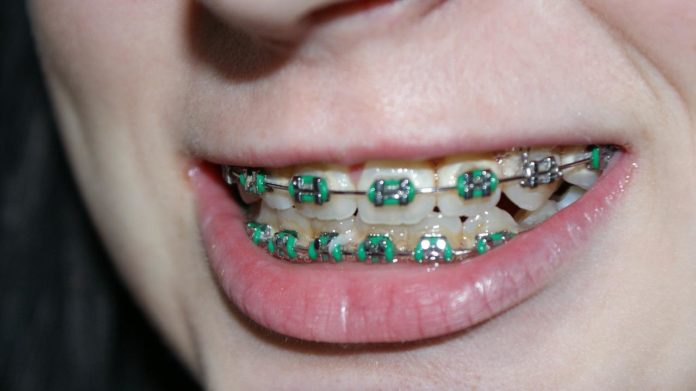If your corrective orthodontics of choice is traditional braces, good oral hygiene is necessary to prevent food debris, bacteria, and plaque from accumulating on your braces and teeth.
However, the wires and brackets of braces can make brushing and flossing awkward as they can be pretty fragile. Common issues include broken or loose brackets, and snapped wires that may start to protrude. These issues can also occur when you’re chewing hard or sticky foods.
You’ll also want to avoid any facial injuries as they can damage your braces and mouth, while nail-biting and chewing on stationery may also cause significant damage. For more on what you need to remember to achieve the best outcome from your teeth straightening treatment for adults, read below.
Avoid Certain Drinks & Sugary Foods
Cut back on sugary foods and soft drinks while going through corrective orthodontics, as an excess of sugar can damage your teeth and braces.
For example, sugary, acidic, and carbonated drinks can weaken the adhesives that attach the brackets of your braces to your teeth. As such, these drinks can increase the risk of a bracket loosening, allowing bacteria to develop underneath said bracket and cause a cavity.
Drinks high in sugar and acidity (such as soft drinks and fruit juices) can also significantly weaken tooth enamel, which may hamper your treatment.
Brush Regularly & Carefully
Going through corrective orthodontics demands a stricter schedule of regular brushing. If you wear braces, rinse your mouth with water and brush after every meal to remove any food particles that may be stuck in and around your braces. The longer bacteria stays on your teeth and braces, the higher the likelihood of developing dental issues such as tooth decay, staining, and gum infections.
When brushing while wearing braces, use fluoride toothpaste and a soft-bristled brush to clean each tooth at the gum line, and above and below the brackets.
The general steps for brushing while wearing braces are as follows:
- Place the brush head above the brackets and angle it downwards to clean above each one.
- Switch your brush position to the bottom of each bracket and clean by turning upwards.
- Once you’re done brushing, rinse your mouth with an antiseptic or antibacterial mouthwash containing fluoride.
If you can’t brush or rinse your teeth right after eating, drink plenty of water to flush away any remaining food particles.
While regular brushing is key to maintaining your braces, be aware that overbrushing may lead to sensitive teeth and gum recession. Be sure to use a soft-bristled toothbrush to avoid damaging your teeth and gums.
Use The Correct Floss & Flossing Techniques
As braces can make brushing harder, it can be even more important to spend time flossing your teeth. By using the proper techniques for flossing while wearing braces, you’ll be able to prevent issues such as cavities, gum inflammation, and bad breath. A general rule of thumb is to floss at least once a day – be sure to get beneath the wires and between the brackets.
As for the floss type, try to get waxed floss as it can glide between your teeth more efficiently, while unwaxed floss is more likely to catch on your braces and shred the floss. If you find flossing difficult, an interdental brush may be a better option if you have pronounced gaps between your teeth, while an oral irrigator can help clean difficult-to-reach areas.
Flossing can take up to three times longer with braces, so be patient and try not to rush through it to ensure your teeth are adequately flossed. It’s best to floss just before bed, so you remove any remaining food debris and break down plaque build-up.
Have Regular Professional Dental Cleaning
Even with regular brushing and flossing to maintain your dental health, the brackets, wires, and bands of your braces make it impossible to remove plaque, stains, and tartar accumulated on your teeth.
By having professional cleaning done, you can help prevent gingivitis and demineralisation of your teeth around the brackets.
Be sure to schedule a cleaning appointment with your dentist every 3 to 6 months (depending on risk factors) to prevent any oral problems that may arise while wearing braces.
Stick To Your Appointment Schedule
Last but not least, sticking to your scheduled dental appointments is vital. Your dentist will measure positive results for your orthodontic teeth straightening treatment within a specific timeframe and make necessary adjustments to avoid prolonging the treatment.
So, make sure to visit your dentist regularly and be sure to ask them any questions you may have about how to take better care of your braces and ensure your corrective orthodontics treatment goes smoothly.


